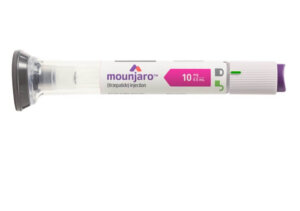I recently conducted a very informal survey with our staff here at IsraelPharm and asked them a simple question: what healthcare subject are our customers most interested in? 8 out of 10 responded quickly and unequivocally: losing weight, and the medications that can help.  What was once a peripheral sideshow of healthcare has become one of the main attractions in modern medicine. The big stars of this show are Ozempic and Mounjaro, drugs originally designed as treatments for type 2 diabetes but that quite fortuitously turned out to be something quite revolutionary.
Questions about these weight-loss medications and similar products are hot topics on social media platforms like TikTok, Facebook, Twitter, and Instagram. However, in many cases, they present contrary opinions – mainly due to a fundamental lack of understanding about what were diabetes medications and their intended use for weight loss.
So, to help clear the dust, I assembled a short “cheat sheet” summarizing the most essential points about this new and exciting therapy area for your reference. Having an objective and balanced picture based on scientific evidence is so important. The following paragraphs will deal with a few of the most interesting facts about how the weight-loss medication revolution came about and then answer some of the most common questions that most informal networks tend to get wrong.
What was once a peripheral sideshow of healthcare has become one of the main attractions in modern medicine. The big stars of this show are Ozempic and Mounjaro, drugs originally designed as treatments for type 2 diabetes but that quite fortuitously turned out to be something quite revolutionary.
Questions about these weight-loss medications and similar products are hot topics on social media platforms like TikTok, Facebook, Twitter, and Instagram. However, in many cases, they present contrary opinions – mainly due to a fundamental lack of understanding about what were diabetes medications and their intended use for weight loss.
So, to help clear the dust, I assembled a short “cheat sheet” summarizing the most essential points about this new and exciting therapy area for your reference. Having an objective and balanced picture based on scientific evidence is so important. The following paragraphs will deal with a few of the most interesting facts about how the weight-loss medication revolution came about and then answer some of the most common questions that most informal networks tend to get wrong.
Are Mounjaro and Ozempic prescribed weight-loss medications?
Currently, Ozempic has only been approved by the FDA as treatments for type 2 diabetes. Even there, they are regarded as suitable only when the simpler drugs, such as insulin itself or Metformin, together with exercise and diet, are not controlling blood sugar levels.
The FDA now registered Mounjaro as a weight-loss drug to be marketed under the name Zepbound. It’s hoped that it will reach our shelves early in 2024.
Novo Nordisk has taken another route and created a different format of semaglutide, which is marketed as Wegovy. Wegovy is an FDA-approved weight-loss drug and can be prescribed for patients who satisfy the definition of obese or overweight with at least one relevant weight-related medical condition such as diabetes or heart disease. It has the same generic formula as semaglutide, but the strength of the dose goes higher – up to 2.4 mg per dose, whereas for Ozempic, the maximum dose is 1 mg.
Is there a definite amount of weight you can lose each week using Mounjaro or Ozempic weight-loss drugs?
It depends on a lot of different factors. Results will differ from person to person based on their weight, medical history, and lifestyle. Requirements for optimizing weight loss with Mounjaro and Ozempic include adherence to healthy eating and regular exercise – so weekly weight loss will vary from person to person.
 What was once a peripheral sideshow of healthcare has become one of the main attractions in modern medicine. The big stars of this show are Ozempic and Mounjaro, drugs originally designed as treatments for type 2 diabetes but that quite fortuitously turned out to be something quite revolutionary.
Questions about these weight-loss medications and similar products are hot topics on social media platforms like TikTok, Facebook, Twitter, and Instagram. However, in many cases, they present contrary opinions – mainly due to a fundamental lack of understanding about what were diabetes medications and their intended use for weight loss.
So, to help clear the dust, I assembled a short “cheat sheet” summarizing the most essential points about this new and exciting therapy area for your reference. Having an objective and balanced picture based on scientific evidence is so important. The following paragraphs will deal with a few of the most interesting facts about how the weight-loss medication revolution came about and then answer some of the most common questions that most informal networks tend to get wrong.
What was once a peripheral sideshow of healthcare has become one of the main attractions in modern medicine. The big stars of this show are Ozempic and Mounjaro, drugs originally designed as treatments for type 2 diabetes but that quite fortuitously turned out to be something quite revolutionary.
Questions about these weight-loss medications and similar products are hot topics on social media platforms like TikTok, Facebook, Twitter, and Instagram. However, in many cases, they present contrary opinions – mainly due to a fundamental lack of understanding about what were diabetes medications and their intended use for weight loss.
So, to help clear the dust, I assembled a short “cheat sheet” summarizing the most essential points about this new and exciting therapy area for your reference. Having an objective and balanced picture based on scientific evidence is so important. The following paragraphs will deal with a few of the most interesting facts about how the weight-loss medication revolution came about and then answer some of the most common questions that most informal networks tend to get wrong.
What kind of drugs are Ozempic and Mounjaro?
Ozempic is marketed by the Danish company Novo Nordisk and is approved by the FDA for the diabetes care (specifically type 2 diabetes – T2D). Its active ingredient is a glucagon-like peptide-1 (GLP-1) receptor agonist with the generic name semaglutide. Mounjaro is marketed by US company Eli Lilly & Company and is currently approved by the FDA for the treatment of T2D. Its active ingredients combine glucagon-like peptide-1 (GLP-1) receptor agonists and a glucose-dependent insulinotropic polypeptide (GIP). This compound has the generic name tirzepatide. Tirzepatide was approved by the FDA in November 2023 for weight-loss in people diagnosed as overweight (BMI between 27.0 and 29.9 who have some other health problems such as high blood pressure or diabetes) or are obese (BMI 30.0 or higher). The drug will be marketed under the brand name Zepbound in early 2024. Interesting facts: Based largely on the success of these two drugs, the companies have outperformed market expectations. The market capitalization of Novo Nordisk now exceeds the GDP of Denmark! According to the Wall Street Journal, Eli Lilly & Company is now “the most valuable standalone pharmaceutical company in the U.S. with a market value of more than $300 billion.”How do GIP/GLP-1 receptor agonists work?
One of the main effects of GIP/GLP-1RAs is to suppress glucagon secretion. The molecule activates the secretion of GIP and GLP-1 receptors in the lining of the intestines when glucose or nutrients are eaten. These stimulate the secretion of insulin from pancreatic beta cells. They also regulate food intake control centers in the brain, which slows gastric emptying, reduces food intake via appetite reduction, and promotes beta cell proliferation. In patients with living with type 2 diabetes, GIP/GLP-1 concentrations are lower than normal after oral glucose-load intake, which can mean that glucagon goes into overdrive. GIP/GLP-1 receptor agonists (a receptor agonist blocks the point on a cell’s surface that is programmed to take up a specific molecule) can restore insulin secretory functions, thereby contributing to managing diabetes through improvements in glycemic control for diabetic patients The shared ingredients in semaglutide and tirzepatide (GIP/GLP-1RAs) are man-made versions of the native human GIP and GLP-1. As a bonus, synthetic GLP-1 is resistant to degradation by the body’s natural enzymes, so it remains active for longer.Are Mounjaro and Ozempic prescribed weight-loss medications?
Currently, Ozempic has only been approved by the FDA as treatments for type 2 diabetes. Even there, they are regarded as suitable only when the simpler drugs, such as insulin itself or Metformin, together with exercise and diet, are not controlling blood sugar levels.
The FDA now registered Mounjaro as a weight-loss drug to be marketed under the name Zepbound. It’s hoped that it will reach our shelves early in 2024.
Novo Nordisk has taken another route and created a different format of semaglutide, which is marketed as Wegovy. Wegovy is an FDA-approved weight-loss drug and can be prescribed for patients who satisfy the definition of obese or overweight with at least one relevant weight-related medical condition such as diabetes or heart disease. It has the same generic formula as semaglutide, but the strength of the dose goes higher – up to 2.4 mg per dose, whereas for Ozempic, the maximum dose is 1 mg.
Is there a definite amount of weight you can lose each week using Mounjaro or Ozempic weight-loss drugs? 
It depends on a lot of different factors. Results will differ from person to person based on their weight, medical history, and lifestyle. Requirements for optimizing weight loss with Mounjaro and Ozempic include adherence to healthy eating and regular exercise – so weekly weight loss will vary from person to person.
Do I have to use weight-loss medications long-term?
The answer to this question is not yet known for certain. Studies on weight-loss trials for both Mounjaro and Wegovy did show that coming to the end of the trials when subjects no longer received the weight-loss medication, there was a pattern of weight being regained, but not to the extent that the whole benefit was lost. It’s impossible to derive a complete answer to this question because external factors also play a part. For example, if people stayed on a controlled diet and exercised, they tended to keep off most of the lost weight. At the opposite end of the scale, some people failed to lose much weight even while on weight-loss medication, largely because they kept eating the wrong foods in the wrong quantities and failed to exercise. Researchers are currently studying how well Mounjaro helps maintain weight in an ongoing clinical trial that looks beyond two years and whether weight loss is maintained after the drug is stopped. Doctors will be able to decide whether Mounjaro should be used long-term with the results of this trial.Can I afford Ozempic or Mounjaro weight-loss medications?
The costs of Ozempic and Mounjaro are based on individual factors, mostly from a patient’s prescribed treatment regimen, their insurance plan, the pharmacy use as the supplier, and their State of residence. Until Mounjaro becomes an FDA-approved weight-loss medication, it has to be prescribed off-label. The same thing goes for Ozempic for weight loss. Although the alternative already available (Wegovy) is FDA-approved for weight loss, most health insurance plans still do not cover it. Comparing off-label prices from US retail pharmacies with IsraelPharm has made purchasing Ozempic from us a popular choice. It’s sold at US retail pharmacies for between $1050 (Ozempic) and $1400 (Wegovy) per 4-shot pen (with no health insurance payback). By contrast, at IsraelPharm, we supply Ozempic at a far lower price – $550 for the four-week dose. Our lower pricing is thanks to the capping of pharmaceutical prices in our government-mandated universal health care system.How to get Mounjaro for weight loss from IsraelPharm.
It is important to be very careful when sourcing Mounjaro through internet platforms, especially those that do not insist on providing a valid prescription. Getting your doctor’s consent via prescription for Mounjaro is essential. There has been an outbreak of bogus pharmacies all over the world that offer to sell Ozempic, Wegovy, and Mounjaro, often at much cheaper prices than they can be obtained from either at retail US pharmacies or from reputable online pharmacies. During the COVID-19 pandemic, supply chains of many medications were disrupted, and unscrupulous businesses jumped in to fill the gaps, often providing fake medications, or at the least non-standard and highly suspect formulations that had not been approved either by the FDA or by the regulatory authorities in their own countries. A better way to obtain Mounjaro from a compounding pharmacy is by using our reputable and supervised service. Here at IsraelPharm, we only ship drugs if a valid prescription was provided – the license of our pharmacist depends on compliance with this law. We are also here to provide the guidance and support you need to get the best results.How are Mounjaro and Ozempic administered?
When prescribed off-label for weight loss, it’s necessary to follow the dosage and instructions given by the prescribing doctor. In most typical cases, the weekly dosages start low and are adjusted gradually until they reach the right amount that yields the desired result. The usual starting dosage is 2.5 milligrams once weekly for the first pen, lasting four weeks. After that, the doctor normally will increase the dose by 2.5 mg for each pen until the maximum dosage of 15 mg is determined as the long-term dose of Mounjaro. Mounjaro and Ozempic are approved by the FDA for other uses. The leaflet and online dosage information may differ from the prescribing doctor’s decision, and in all cases, the doctor’s recommendation takes precedence over any other dosage notes. Both drugs come in a four-dose pen for self-administered subcutaneous injection. It is generally advised to inject under the skin of the abdomen or thigh. It’s also advisable to rotate each subsequent week’s dose onto a different portion of the body, ensuring not to inject twice in consecutive weeks at the same spot. If under the care of another person, they should give the injection under the skin of your upper arm, switching between arms each week. The drugs can be injected at any time of day. It’s advisable to try to inject it on the same day each week so that doses are not missed or duplicated.Who qualifies for a prescription of Mounjaro or Ozempic off-label for weight-loss medications?
Diabetes medications will usually only be prescribed off-label as weight-loss medications for adults who have not yet gone on to develop type 2 diabetes, but with the following conditions:- Body mass index (BMI) of 30 or higher
- BMI higher than 27 but lower than 30 when at least one health condition related to weight, such as high cholesterol, high blood pressure, or sleep apnea.


















